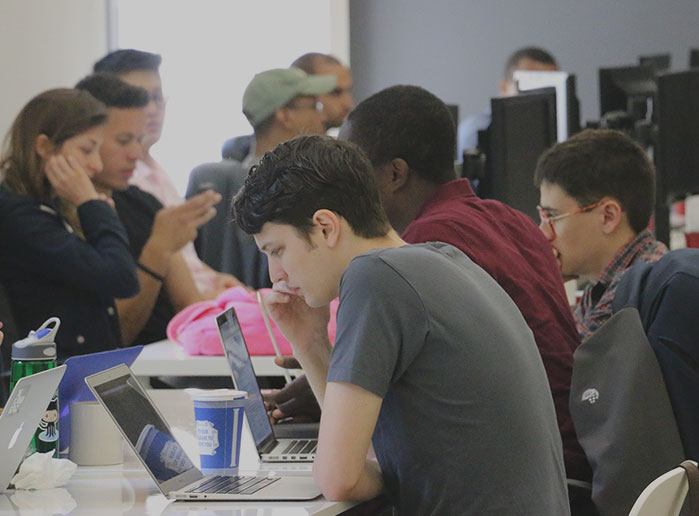Shana Moore discovered her love for programming only after spending years pursuing a career path in government contracting and the telecommunications industry. Shana was well aware that she wasn’t passionate about the roles she held or their growth potential, but she feared it was too late for a course correction. However, after a few exciting brushes with code, Shana decided to let go of that fear and commit to learning how to program. She attended Flatiron School’s online campus, Learn.co, and she’s gone on to be one of the first graduates of the program—she’s also living proof that it’s never too late to switch to a career you’re passionate about if you’re committed to learning.
Shana has been kind enough to take a few minutes away from her new position on the custom dev team at Qualcomm to share a bit about her journey to coding.
I’d love to hear about your background. Can you tell me more about the career path you were pursuing prior to web development?
I graduated from UCSD with a BA in Human Development and a minor in Spanish Literature, thinking that I would get involved with social work. I love helping people but quickly realized after a couple of internships that the path I was pursuing wasn’t a good fit for me. “Too late” to change majors, I graduated in 2009 and struggled to find employment so I basically accepted any job that would have me, which happened to have been in the government contracting field doing administrative tasks, managing work requests, and coordinating projects.
I later switched to the telecommunications industry doing similar tasks with more involvement in project coordination and management. It was a fine job; I appreciated my team and absolutely loved working from home, but I knew it didn’t suit me either in regards to a long-term career. I wasn’t interested in its traditional path of promotion and expressed interest in switching to the company’s development team. I got laid off in February but thankfully had already started taking steps towards changing my career by learning how to program. I just didn’t expect to get kicked out of the nest so soon and involuntarily!
How did you discover coding? What inspired you to learn it?
My first taste of code came during my role as a Project Coordinator. My favorite part of the job was creating and maintaining spreadsheets for my team, using Microsoft Excel. I loved the so-called magic of Excel functions, and soon discovered that I could manipulate my spreadsheets and automate processes by writing macros with VBA (Visual Basic for Application). Not only did this make my job easier, but it increased the overall efficiency of my manager and team! We were able to do more and work smarter than what Excel offers “out-of-the-box”, which I found to be extremely rewarding.
But it wasn’t until I had a desire to create supplemental content to my YouTube channel via a web or mobile app, that I truly started to take interest in code. Moreover, during this time I met my new neighbor, a Software Engineer at Intuit who developed with Ruby. She was a tremendous inspiration to me and made me realize its career potential.
What brought you to Flatiron School’s online course in particular?
My neighbor was also the organizer for Rails Camp, which I attended even though I hardly knew a thing at the time. After meeting so many amazing people and seeing all the cool projects they built, I immediately decided to take my learning more seriously by enrolling in a structured program. To be honest, I considered several in-person bootcamps but was afraid of the large financial commitment in addition to quitting my job. I first discovered Learn on Twitter and saw it as a more reasonable and flexible alternative.
What was your favorite part of using the Learn.co platform?
My favorite part of Learn is the community and the instructors. The instructors and staff have helped me in more ways than I could have ever imagined. And even though it’s likely you will never meet them and/or other students in your cohort (though there are several meetups in big cities), everyone is extremely supportive of each other and no one feels like a stranger to me.
What was your biggest challenge when learning to program?
There were several challenges for me. When signing up for an online program like Learn, you have to be self-disciplined enough to program every single day. If you need someone to check in or hold your hand, online learning may not be the best fit for you. Another challenge is that learning how to program is not easy (for me). There were many moments of self-doubt and questioning whether I am smart enough. The breakthroughs are euphoric though.
Tell me about your role and the work you’re doing at Qualcomm. What’s a specific thing you recently worked on? What’s your favorite part of what you’re doing now?
I’m currently interning on Qualcomm’s custom dev team. We create and maintain applications for internal use that mainly support the HR and identity management processes. This is my fourth week here and I am just finishing up a Sprint that involved me creating an additional admin role to one application (using Java and Velocity) and updating the UI of another (using SQL, Java, Velocity, HTML/CSS). I absolutely love working here for several reasons, but my favorite part is being introduced to new languages and frameworks in a hands-on way.
Has your past career informed how you approach the work you do now?
I definitely don’t regret my past career. It’s actually interesting interning here because I see that there are so many career paths one could take in tech, a few which seem to be a perfect blend between my previous experiences and new technical knowledge, such as IT Project Management and System Analysts. But in direct relation to the work I do now as a developer, my past career has taught me what it means to be a team, how to prioritize and manage projects, and how to communicate, in addition to several other soft/hard skills. A coworker has mentioned that he sees maturity in me even though he thought I was the typical intern of 19 or 20 years old (I’m 29). I believe it’s because of my previous experience. I know what it means to work and I know how to work hard. In addition, I understand the importance of forming relationships with others to build good rapport amongst the team and customers alike.
Would you recommend that others learn to code?
Absolutely. I’ve recently been appointed as the chapter co-leader for a group called Girl Develop It (San Diego), where I encourage others to learn code every day. Even though you may not want to be a developer, you will never regret learning how to code. It’ll teach you how to problem solve, and help you communicate with others in a more technical role. Additionally, computer programming is the language of our future. It would be in your best interest to learn and to have fun doing so.
You can read more about Shana’s coding journey on her blog.
Interested in learning to code or moving into a tech career like Shana? Head over to Learn.co to get started.
Written byJOSH HIRSHFELD
Content Marketing Manager, Flatiron School

